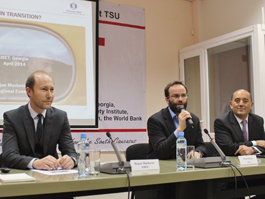On April 8, representatives of the European Bank for Reconstruction and Development (EBRD) presented their Transition Report at ISET. EBRD’s lead economist for Georgia, Bojan Markovic, spoke about the reform progress and economic developments in the year 2013 across the wider transition region, which includes Georgia.
The presentation, titled “Stuck in Transition” – which had an expressive photo of a young man sitting in an old Soviet bus as its opening slide – was introduced by Mr. Markovic. He began by discussing long term growth prospects.
At low levels of productivity, in the early stages of transition, easy growth could be achieved at the expense of increasing Total Factor Productivity, however, this opportunity has generally been exhausted in Georgia. For further development many more structural reforms are needed. The presentation continued with a discussion of the relationship between political structure and economic success. Is democracy needed for growth? Not necessarily. Democracy is a driver of reforms, but it is not the only one. It propels the necessary reforms, but does not always do so. Interestingly, in oil rich countries polity2 scores and income per capita have a negative correlation, whereas this correlation is positive in non-oil producing countries. What is more important is not the political system, but good economic institutions. Improving economic institutions within the given political system must thus be the aim: in particular, international integration, feasible political reforms, exploiting political windows of opportunity, and improving human capital and inclusion. Mr. Markovic finished the presentation by discussing each of these issues, paying particular attention to human capital. The presentation provoked many questions and led to a long discussion with the audience.
ISET would like to thank the representatives of EBRD and particularly Mr. Bojan Markovic for providing a very interesting presentation and question session.











